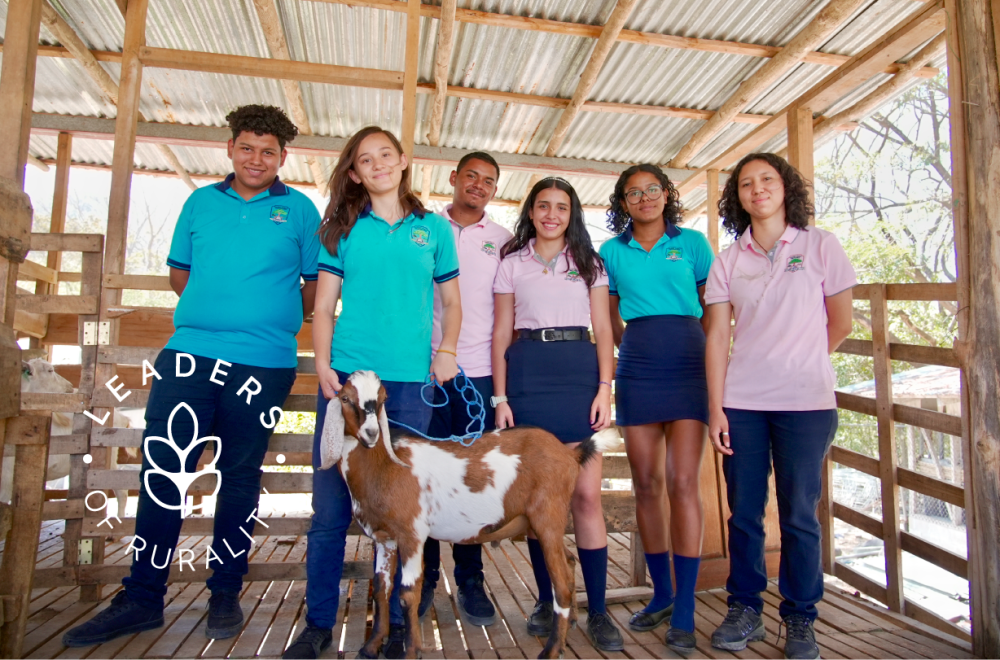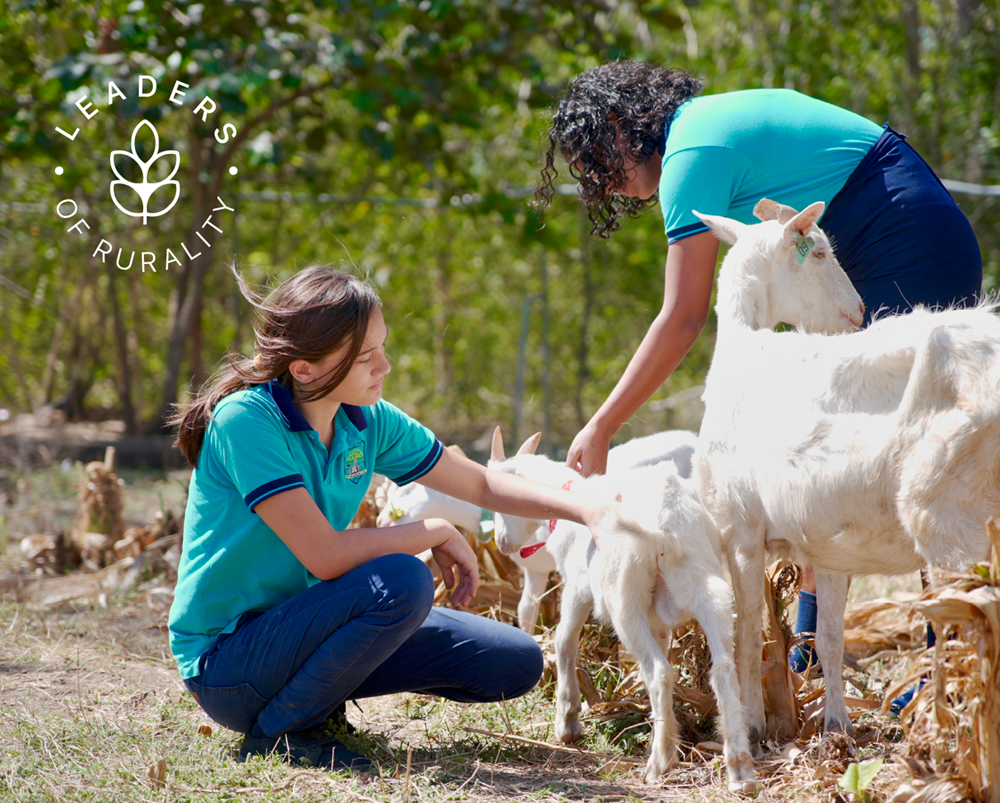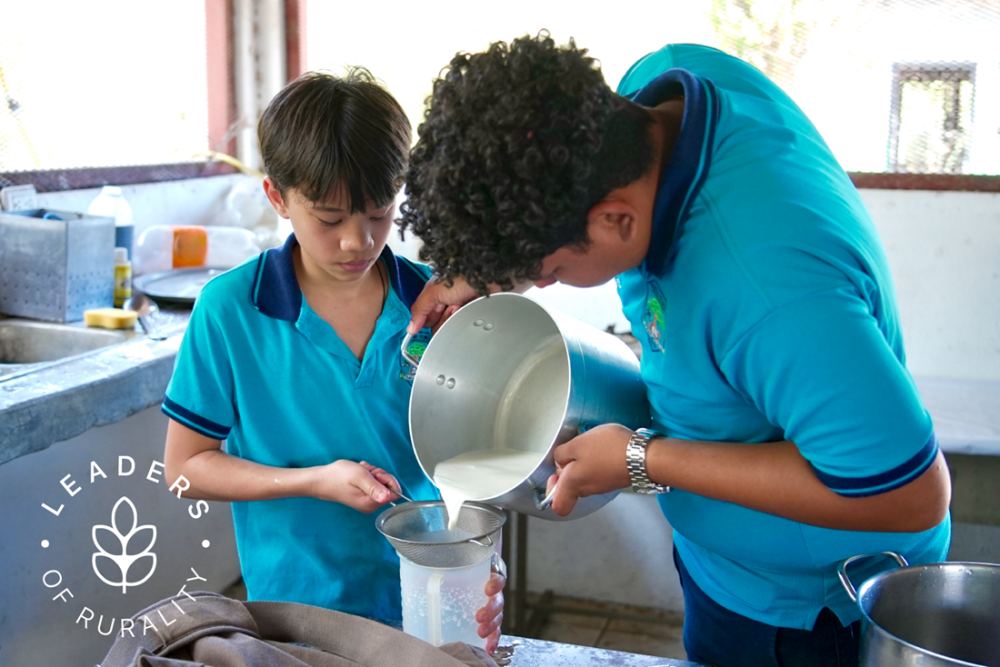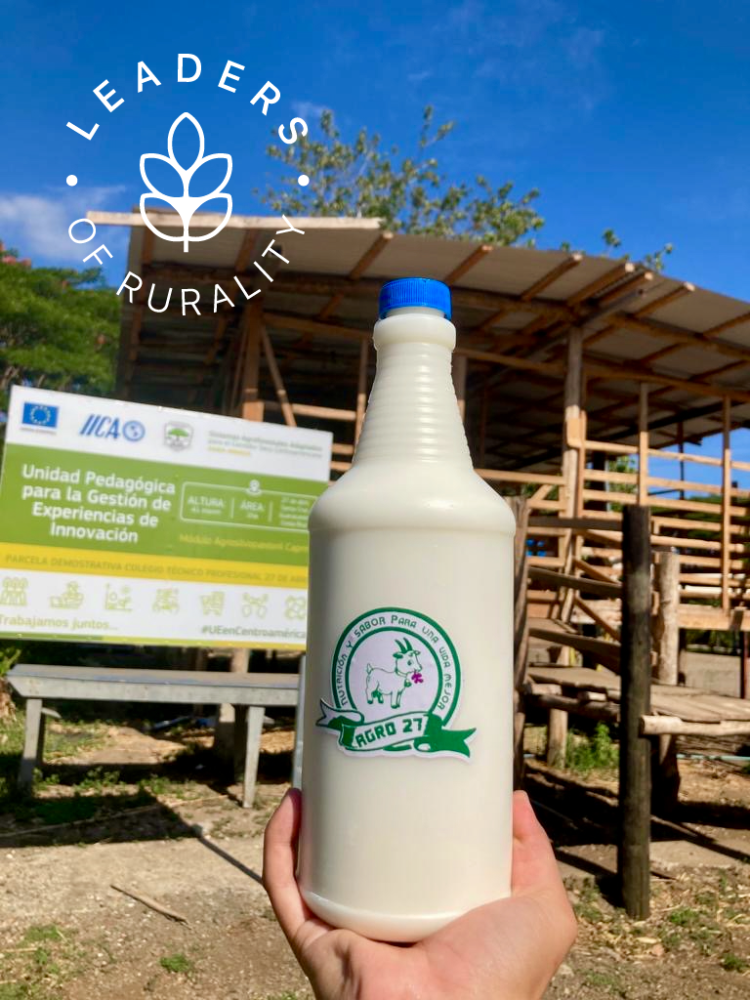Costa Rican high school students, creators of a module for the promotion and dissemination of silvopastoral goat farming, recognized by IICA as Leaders of Rurality of the Americas

San José, 7 March 2024 (IICA). Twenty-five students from the 27 de Abril Professional Technical School (PTS), located in the rural area of Santa Cruz, Guanacaste, Costa Rica, were distinguished as Leaders of Rurality of the Americas by the Ministry of Agriculture and Livestock (MAG) of this country and the Inter-American Institute for Cooperation on Agriculture (IICA).
From its training center, the group promotes education and the dissemination of agricultural technologies for goat dairy production in silvopastoral systems, with a view to fostering entrepreneurship and strengthening food security and climate resilience in rural territories.
These students, who are between 13 and 17 years old, and are members of Agro27 – CONAC 4S, received the “Soul of Rurality” recognition, awarded by IICA to provide visibility to men and women who leave their mark and make a difference in the rural milieu of the Americas, and who are crucial for food and nutritional security and the environmental sustainability of the planet. The young entrepreneurs will be received by the Director General of IICA, Manuel Otero, within the framework of a meeting with rural leaders from across the hemisphere.
Agro27 was established in April 2022 and in under two years has been able to design, implement and manage a module for the promotion and dissemination of goat dairy production in silvopastoral systems with a focus on youth and community producers, making effective use of resources and knowledge of public and private institutions and international cooperation.
The initiative carries out this inspiring project in the facilities of the 27 de Abril PTS, in the canton of Santa Cruz, province of Guanacaste. Located in the northwest of Costa Rica, more than 220 kilometers from San José, the school is surrounded by large plains suitable for raising livestock and growing grains, as well as lush landscapes and beaches bathed by the Pacific Ocean. This area, however, also faces the challenges of the Central American Dry Corridor.
The group came together to participate in the Young Challenge: Agriculture 4.0 initiative, part of the Adapted Agroforestry Systems for the Central American Dry Corridor (AGRO-INNOVA) project, implemented by the European Union and IICA.
For this challenge, and hand in hand with the MAG extension programs, the National Council of Clubs 4S (CONAC 4S), the National Chamber of Dairy Farmers (CNPL), the technical assistance of AGRO-INNOVA and the support of the agriculture program of the school, the students gave life to this exemplary project that today constitutes a formal education, training and demonstration unit for the dissemination of technologies used in goat dairy production.

Visionary entrepreneurs, passionate about agriculture
In a barn that they built themselves, these young visionaries put into practice the knowledge acquired in specialized training courses of the AGRO-INNOVA project, the School of Agricultural Leaders of Costa Rica, the training program of the 27 de Abril PTS, and during field visits facilitated by the Tropical Agricultural Research and Teaching Center (CATIE).
The students have 13 goats -including the male- with which they produce milk and cheese. They are currently venturing into the manufacturing of other by-products such as yogurt.
“We sell milk in containers of 500 milliliters for 1,000 colones (almost two dollars) and one liter for 2,000 colones (4 dollars). We also sell cheese, a kilo for 8,000 colones (15 dollars). We use social media to reach the people in the community who contact us,” said Ehyni Rodríguez, a member of Agro27 and a student in sixth year of high school (in Costa Rica, technical training school courses span over 6 years).
The money collected from these sales, combined with other resources obtained independently to support the project, is used to purchase inputs for feeding and caring for the goats, such as concentrate and milk containers. In addition, the group recently acquired a male goat to improve reproduction, milking, productivity and yields.
"We are paying for the male in installments. For the inputs we save as much money as we can and try to buy them at the best price possible, to see how we can make this more profitable," explained Maya Abueg, fifth-year student and president of the Agro27 Board of Directors, which was created at the beginning of the initiative and which meets periodically to make decisions about the project, and define roles and tasks for each member.
These young farmers are in charge of the entire production process; their teachers only act as a guide. They are in charge of planting and cutting the forage, which they later ensilage to feed the animals, and the sugar cane they use to generate concentrate. They are also responsible for the care and well-being of the goats, milking, pasteurization, cleaning and waste disposal in the stalls.
Animal manure is used in a biodigester to generate the gas with which they pasteurize the milk.
Likewise, data is collected for decision-making, including a record of the liters of milk produced and any shots administered to the goats. They also write meeting minutes.
“Our tasks include feeding the goats, milking them, pasteurizing the milk, checking up on them, cutting their hooves, and selling the milk,” explained Dairon Briceño, who is in his sixth year.

“My role is milking and pasteurization; before this project I didn't know how to milk goats, but little by little I learned how to make cheese. It’s easy because if you want to do things well, you quickly get the hang of it,” added Yeikol Ortiz, eighth grade student.
“You have to cut the cane, put it in the cart and feed the goats, morning and afternoon. It is a difficult job, but the project is for people who like it, and if we are here, it’s because we enjoy it, not for convenience,” explained Norton Villagra, also in eighth grade.
Dedication without excuses to overcome the challenges
To carry out this challenging work, young people must combine their academic obligations with the project. Out of their usual school day schedule, which goes from 7 am to 4:20 pm, they dedicate about three hours a day to goat farming. This work is generally carried out under the blazing sun, with temperatures of up to 39 °C, typical of this area, which is part of the Central American Dry Corridor.
As proof of their exceptional commitment, they sacrifice part of their vacation time to attend the school and feed the animals, milk them and process the milk. There are students who must travel more than 20 km roundtrip by bicycle to get to the center. They do this to save money or because the transportation service is either non-existent or irregular.
Furthermore, thanks to the experience with Agro27, three of the students have bought their own goats in order to establish goat modules, produce in their homes and provide training to community producers. Others have chickens for egg production.
In their last year of high school, the project encouraged many of the young participants to go on to study agronomy and veterinary engineering, to maintain their ties to rurality and the agricultural sector, where they see a promising future

"When I started school, I didn't know the first thing about agriculture. I started to like it, and that's when I said, 'this is for me, this is what I really want to do,’ and I plan to study veterinary medicine. It means so much to me, and is essential for my future. My plan is to have something like this at home, this is very nice,” said Sherilyn González, sixth-grade student.
The dream of these young entrepreneurs, passionate about agriculture and sustainability, with a bold vision and the determination to build a more prosperous future for themselves, their families and the community, is to take the project to the next level in the medium term. “We envision ourselves supplying area supermarkets, hotels and restaurants. We want strong, resistant and productive goats, to diversify dairy products, and for others to know that goat milk is very good and nutritious,” said student Ehyni Rodríguez without hesitation.
Of course, the most important thing for them is to transfer the knowledge that they have acquired over the years to other generations, making sure it is passed on and remains inclusive, and that the silvopastoral-goat module that they created in the PTS lasts over time, incorporating more resources and new technologies.
Currently, of the 630 students at the 27 de Abril PTS, 60 are specializing in this program.
“We want to draft a set of guidelines that bring out the most important parts of the project, and include all the knowledge we have acquired, giving presentations so that students become interested, teaching them how to trim chubs and hooves, give shots and things like that, so that they join our group. If we do so, when we leave school, we will have another generation of well-educated students and the project will last over time, ensuring that the seed we planted remains alive” concluded the president of the Agro27 group, Maya Abueg.
“These types of projects fill us with enthusiasm, as we look for different ways to make our youth fall in love with these initiatives and stay in the countryside. We must give them the tools and platforms so that they can thrive and develop a productive project that generates income for them,” stated the Technical Vice Minister of the MAG, Fernando Vargas.
The Director General of IICA, Manuel Otero, explained that the Leaders of Rurality of the Americas initiative seeks to “recognize those people who make a difference in rural areas, and who instead of giving up, always have something more to give, so that their stories are known and become a source of inspiration for young people, to build a future based on agriculture.”
The IICA “Soul of Rurality” award will be presented to the following students:
- Sherelyn González Chavarría
- Dayanna López
- Dairon Briceño Ordóñez
- Maya Abueg
- Ashton Abueg
- Norton Villagra
- José Luis Moraga
- Josué Álvarez Gutiérrez
- Kevin Leal Barrios
- Ehyni Rodríguez Cisneros
- Yeikol Ortiz Matarrita
Video only in Spanish
More information:
Institutional Communication Division.
comunicacion.institucional@iica.int
Photo Gallery